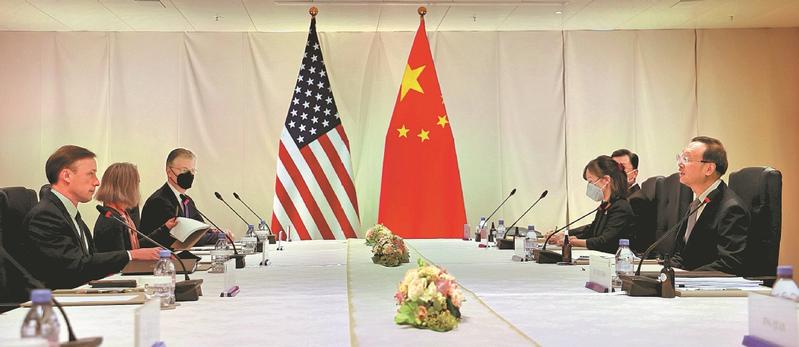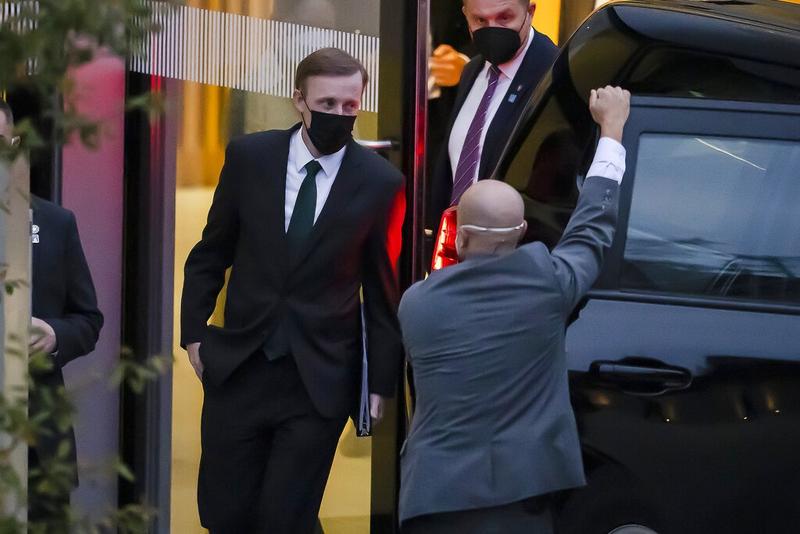 Yang Jiechi (right), a member of the Political Bureau of the Communist Party of China Central Committee and director of the Office of the Foreign Affairs Commission of the CPC Central Committee, talks with United States National Security Advisor Jake Sullivan (left) during a meeting on China-US relations at a hotel in Zurich Airport, Switzerland, on Oct 6, 2021. (PHOTO / XINHUA)
Yang Jiechi (right), a member of the Political Bureau of the Communist Party of China Central Committee and director of the Office of the Foreign Affairs Commission of the CPC Central Committee, talks with United States National Security Advisor Jake Sullivan (left) during a meeting on China-US relations at a hotel in Zurich Airport, Switzerland, on Oct 6, 2021. (PHOTO / XINHUA)
Beijing and Washington, during a meeting in Zurich, have agreed to further realize their top leaders' recent consensus, boost strategic contacts, manage differences, avoid conflict and confrontation, advance cooperation and bring their ties back on track.
Although senior US officials have tried to tone down hostility in recent talks, experts said more practical, coolheaded US actions are needed to remove attempts to suppress China, repair the chilly ties and set the stage for further high-level interactions.
The meeting involving senior diplomats from China and the United States took place in Zurich, Switzerland, on Wednesday.
The delegations were respectively led by Yang Jiechi, a member of the Political Bureau of the Communist Party of China Central Committee and director of the Office of the Foreign Affairs Commission of the CPC Central Committee, and US National Security Advisor Jake Sullivan.
The meeting on Wednesday was helpful for breaking Washington's illusion. Damage control on the ties and pragmatism are critical for the US at the moment.
Wang Dong, professor and executive director of Peking University's Institute for Global Cooperation and Understanding
They exchanged views on China-US ties as well as global and regional issues of common concern, such as climate change.
The two sides agreed to maintain frequent talks and communication on important issues.
The Chinese Foreign Ministry called the meeting "extensive, candid and in-depth", and said it was "constructive and conducive to improving mutual understanding".
At the meeting, Beijing stated its clear objection to using the word "competition" to define their relations.
Wang Dong, a professor and executive director of Peking University's Institute for Global Cooperation and Understanding, noted that US officials vowed to ensure "responsible competition" with China at the meeting.
Wang said the administration of President Joe Biden is continuing the negative legacy of former president Donald Trump's administration-one of suppression and misjudgment of China.
ALSO READ: Chinese envoy: China ready to mend ties with US
"The meeting on Wednesday was helpful for breaking Washington's illusion. Damage control on the ties and pragmatism are critical for the US at the moment," Wang said.
 Yang Jiechi (center), a member of the Political Bureau of the Communist Party of China Central Committee and director of the Office of the Foreign Affairs Commission of the CPC Central Committee, and his delegation leave a hotel at Zurich Airport, Switzerland, on Oct 6, 2021. (MICHAEL BUHOLZER / KEYSTONE VIA AP)
Yang Jiechi (center), a member of the Political Bureau of the Communist Party of China Central Committee and director of the Office of the Foreign Affairs Commission of the CPC Central Committee, and his delegation leave a hotel at Zurich Airport, Switzerland, on Oct 6, 2021. (MICHAEL BUHOLZER / KEYSTONE VIA AP)
Since (US President Joe) Biden said so (no intention of curtailing China's development or waging a "new Cold War"), we should check whether Washington can honor the president's commitment with actions.
Su Xiaohui, deputy director of the Department of American Studies at the China Institute of International Studies
Following China-US diplomatic meetings in Anchorage and in Tianjin earlier this year, "it has dawned on Washington that arbitrarily pressuring China and speaking in a haughty tone will not help achieve its strategic goals", said Su Xiaohui, deputy director of the Department of American Studies at the China Institute of International Studies.
In statements released after the Wednesday meeting, both countries underscored that the meeting followed up on the phone conversation between President Xi Jinping and President Biden on Sept 10.
Su noted that Yang mentioned Biden's recent positive comments on China-US relations, that the US has no intention of curtailing China's development or waging a "new Cold War".
"Since Biden said so, we should check whether Washington can honor the president's commitment with actions," she said.
During the meeting, Yang said that whether the two countries handle their ties well has a bearing on the fundamental interests of both countries and their peoples as well as the future and destiny of the world.
China-US cooperation will benefit the two countries as well as the world, while confrontation will only inflict serious damage, Yang said.
He also said he hoped the US would adopt a rational and pragmatic policy toward China and work with China to respect each other's core interests and major concerns.
 White House national security adviser Jake Sullivan (left) and his delegation leave a hotel in Zurich, Switzerland, where a meeting between senior Chinese and US officials took place on Oct 6, 2021. (MICHAEL BUHOLZER / KEYSTONE VIA AP)
White House national security adviser Jake Sullivan (left) and his delegation leave a hotel in Zurich, Switzerland, where a meeting between senior Chinese and US officials took place on Oct 6, 2021. (MICHAEL BUHOLZER / KEYSTONE VIA AP)
Cheng Li, director of the John L. Thornton China Center at the Brookings Institution, said the meeting on Wednesday was a positive step forward following the two presidents' phone talk, and the Biden administration has realized that its allies do not want to choose sides between the US and China
Diao Daming, an associate professor of US studies at Renmin University of China, said, "As led by the two presidents, the two sides are steadily pressing ahead their contacts at working levels and higher."
A proper perception of China is not enough and "should be accompanied by tangible actions in order to create a necessary, enabling environment for further China-US high-level interaction", Diao said.
"It is both possible and necessary for the two countries to deepen dialogue in areas such as trade, militaries, regional security, culture, COVID-19 response and global governance," Diao added.
During the meeting, Yang elaborated Chinese mainland's position on Taiwan, the Hong Kong Special Administrative Region, Xinjiang and Tibet autonomous regions, maritime domain, human rights and other issues.
He said the US should earnestly respect China's sovereignty, security and development interests and stop using these issues to interfere in China's domestic affairs.
READ MORE: China stresses value of US business ties
The US side said it upholds the one-China policy. Cheng Li, director of the John L. Thornton China Center at the Brookings Institution, said the meeting on Wednesday was a positive step forward following the two presidents' phone talk, and the Biden administration has realized that its allies do not want to choose sides between the US and China.
However, Li said he does not believe this will be a turning point in the strained relationship, as many of the problems are structural and have been complicated by fractured US domestic politics.


